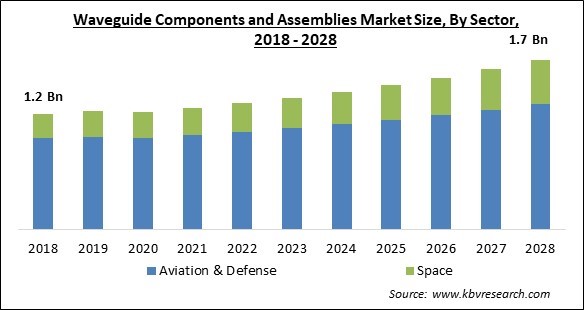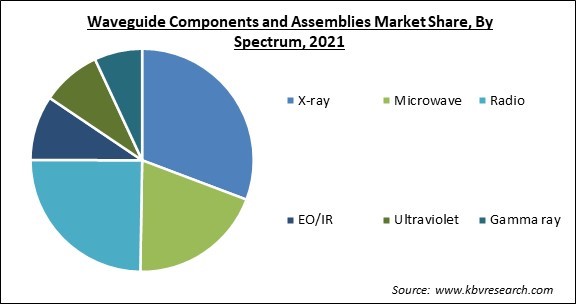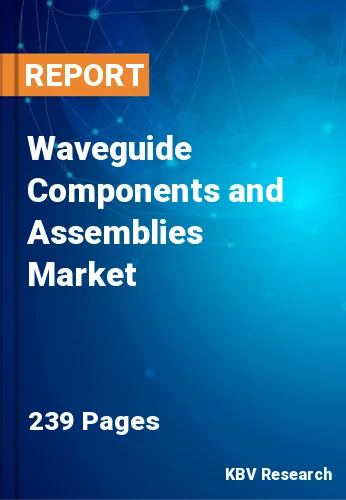The Global Waveguide Components and Assemblies Market size is expected to reach $1.7 billion by 2028, rising at a market growth of 5.0% CAGR during the forecast period.
Microwave transmission systems frequently employ waveguides. They can be a better and more straightforward alternative to coaxial technology. It can also serve as a link between transmitters and receivers. Waveguides are often composed of a hollow metal rectangle or tube, and they are able to disseminate electricity and capacitance in the spaces between the walls. This can be done in several ways. High-frequency signals are handled very well by waveguides. They are well insulated and can segregate signals, which is particularly beneficial if there are other adjacent signals that could interfere in the transmission. When using microwave frequencies, they can also tolerate strong transmission peaks with minimal signal loss. They minimize the requirement for dielectric materials and eliminate the necessity of several conductors, saving time and money in the process. Waveguides are structures or devices that can control and direct signal transmission. It is a hollow metal tube with a uniform cross-section that is used to transmit electromagnetic waves and is usually composed of metals, such as copper or silver.
A waveguide is a framework that channels waves like electromagnetic sound or waves with little energy loss by limiting energy transfer to one direction. Wave intensities diminish as per the inverse square law as they extend into three-dimensional space without the physical limitation of a waveguide. Waveguides come in a variety of shapes and sizes to accommodate various sorts of waves. A hollow conductive metal pipe used to convey high-frequency radio waves, particularly microwaves, is the original and most common meaning. At higher radio frequencies, dielectric waveguides are used, and optical fibers and transparent dielectric waveguides function as light waveguides. Air ducts and horns are employed as sound waveguides in musical loudspeakers and instruments, while ultrasonic machining uses specially-shaped metal poles to conduct ultrasonic waves.
A waveguide's geometry reflects its function with several outcomes. In addition to the more popular kinds that channel waves in one dimension, two-dimensional slab waveguides confine waves to two dimensions. The size of a waveguide is also determined by the frequency of the transmitted wave. Each waveguide has a cutoff wavelength defined by its size and would not conduct waves of longer wavelength. In addition, an optical fiber that directs light would not carry microwaves with a much longer wavelength.

The COVID-19 pandemic had a severe impact on the worldwide economy. Businesses all over the world suffered a steep downfall in terms of economy. In addition, in order to regulate the spread of the COVID-19 infection, governments across the world were compelled to impose a lockdown in their countries. The lockdown scenario led a significant number of companies and manufacturing units to temporary closures, which caused a considerable business loss for these organizations. Moreover, due to the travel restrictions enforced by governments, there was a major disruption in the worldwide supply chain, which caused a shortage of the supply of several components of various products and services, including waveguide components and assemblies.
The development of high-tech new-generation missiles poses a significant threat to critical locations and assets, such as military ships and airbases. Nuclear-capable ballistic missiles, as well as high-speed cruise missiles, are among the latest advancements. Nuclear ballistic missiles are capable of destroying cities and killing people. Various countries are working on sophisticated weapons that can counter advanced air defense systems including Patriot Advanced Capability-3 (PAC-3), the Medium Extended Air Defense System (MEADS), and S-400. Various developed nations have developed hypersonic missiles, for example, Brahmos, that is tough for missile defense systems to intercept. As a result of these advancements, new-generation high-speed air defense radar systems are now required.
Waveguides, both rigid and flexible, are used in a variety of applications. Commercial and military radars, satellite communications, industrial microwaves, medical linear accelerators, and high-energy physics research are all examples of these technologies. Rectangular waveguides, as well as other passive microwave components, are used in each of these industries for crucial applications. Waveguides are used in everything from food processing to oncology treatment as well as weather and defense radar systems. Both rectangular waveguide designs are used by the military. Both are utilized in a variety of frequency bands in airborne, naval, as well as ground-based radar systems.
Sensors are used to determine a satellite's present orientation or attitude, which can be done via Earth sensing, RF interferometry, or start tracking. End-use subsystems, such as antennas, that are supported by waveguide assemblies are typically passive devices that focus on the inherent received or transmitted signal energy. For example, typical ground station communications transmitters with a 100-watt output feeding through a 60-dB gain antenna should have an equivalent isotopically radiated power (EIRP) of 80 dBW or greater in the direction of the primary antenna beam.

Based on Spectrum, the market is segmented into X-ray, Microwave, Radio, EO/IR, Ultraviolet, and Gamma ray. In 2021, the x-rays segment procured the largest revenue share of the waveguide components and assemblies market. The surging growth of the segment is owing to the increasing utilization of this technology. Despite the fact that x-rays are a common technique for visualizing the internal features of solid things, brilliant beams emitted in a single direction onto the subject of interest are tough to obtain in a laboratory setting. Small-scale sources emit x-ray radiation in all directions, unlike large-scale accelerators, which create highly collimated beams. X-rays cannot be easily controlled with mirrors or lenses once they have been emitted.
Based on Sector, the market is segmented into Aviation & Defense and Space. In 2021, the space segment garnered a substantial revenue share of the waveguide components and assemblies market. The growth of this segment is attributed to the fact that waveguides are often employed to transmit signals in spacecraft subsystems. Borescope inspection of a flexible waveguide after noting a transponder output power decline found a green contaminating residue on silver-plated copper and brass portions. Waveguide systems are widely utilized in satellite communication payloads. The industry is moving toward higher frequency waveguide systems as demand for the constrained frequency spectrum grows. To manufacture these systems, unique RF design, as well as new disruptive manufacturing technologies, is required.
Based on Component, the market is segmented into Loads & Filters, Adapters, Couplers, Isolators & Circulators, Duplexers, Phase Shifters, Power Combiners, and Others. In 2021, the loads and filter segment procured the highest revenue share of the waveguide components and assemblies market. The increasing growth of the segment is attributed to the increasing utilization of loads and filters in waveguide components and assemblies. The rising adoption is being driven by the fact that loads and filters are the most essential components of waveguide components and assemblies.
| Report Attribute | Details |
|---|---|
| Market size value in 2021 | USD 1.2 Billion |
| Market size forecast in 2028 | USD 1.7 Billion |
| Base Year | 2021 |
| Historical Period | 2018 to 2020 |
| Forecast Period | 2022 to 2028 |
| Revenue Growth Rate | CAGR of 5% from 2022 to 2028 |
| Number of Pages | 239 |
| Number of Tables | 420 |
| Report coverage | Market Trends, Revenue Estimation and Forecast, Segmentation Analysis, Regional and Country Breakdown, Competitive Landscape, Companies Strategic Developments, Company Profiling |
| Segments covered | Component, Spectrum, Sector, Region |
| Country scope | US, Canada, Mexico, Germany, UK, France, Russia, Spain, Italy, China, Japan, India, South Korea, Singapore, Malaysia, Brazil, Argentina, UAE, Saudi Arabia, South Africa, Nigeria |
| Growth Drivers |
|
| Restraints |
|
Based on Regions, the market is segmented into North America, Europe, Asia Pacific, and Latin America, Middle East & Africa. In 2021, North America accounted for the largest revenue share of the waveguide components and assemblies market. The growth of the regional market is being augmented due to the increasing need for radar systems, which encourages the growth of waveguide components within the aerospace industry. Moreover, the nation has made significant investments in modern satellite and radar systems in order to strengthen its footprint across the market.
Free Valuable Insights: Global Waveguide Components and Assemblies Market size to reach USD 1.7 Billion by 2028
The market research report covers the analysis of key stake holders of the market. Key companies profiled in the report include Northrop Grumman Corporation, Teledyne Technologies, Inc., Cobham Advanced Electronic Solutions, Eravant, Inc., SAS Industries, Inc., Quantic Electronics, Millimeter Wave Products, Inc., ETL Systems, M2 Global Technology, Ltd., and Ducommun Incorporated.
By Spectrum
By Sector
By Component
By Geography
The global waveguide components and assemblies market size is expected to reach $1.7 billion by 2028.
Rising demand for new-generation advanced warfare systems are driving the market in coming years, however, risk of poor signal transmission in space applications growth of the market.
Northrop Grumman Corporation, Teledyne Technologies, Inc., Cobham Advanced Electronic Solutions, Eravant, Inc., SAS Industries, Inc., Quantic Electronics, Millimeter Wave Products, Inc., ETL Systems, M2 Global Technology, Ltd., and Ducommun Incorporated.
The expected CAGR of the waveguide components and assemblies market is 5% from 2022 to 2028.
The Aviation & Defense segment acquired maximum revenue share in the Global Waveguide Components and Assemblies Market by Sector in 2021, thereby, achieving a market value of $1.3 billion by 2028.
The North America market dominated the Global Waveguide Components and Assemblies Market by Region in 2021, and would continue to be a dominant market till 2028.
Our team of dedicated experts can provide you with attractive expansion opportunities for your business.

